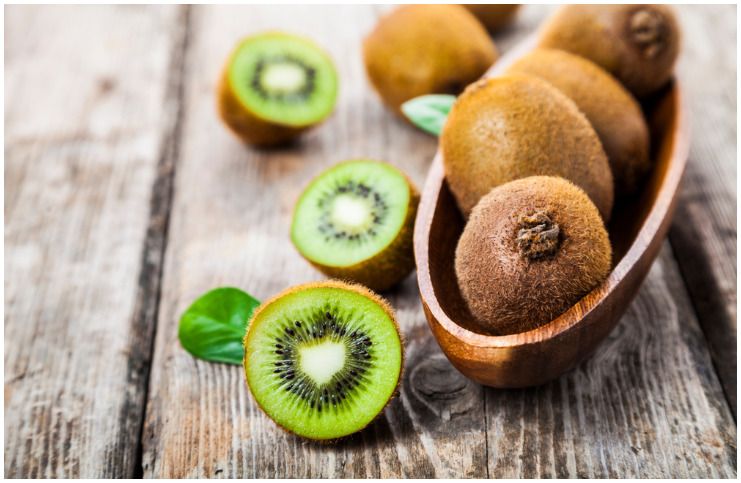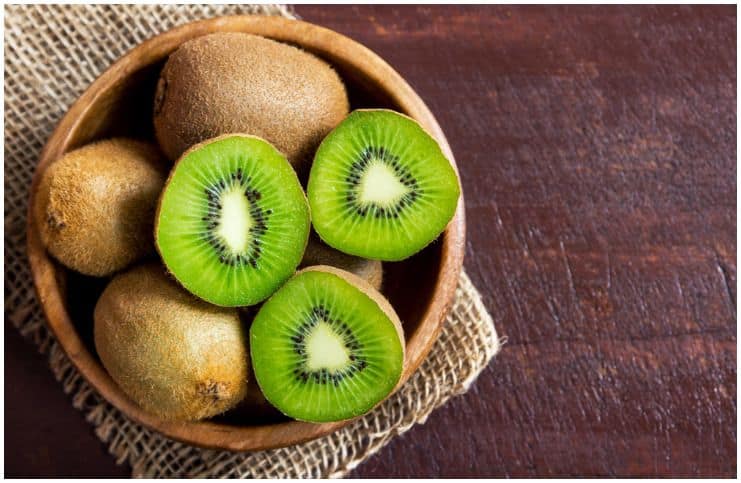Interesting Facts
Kiwifruit is native to Chang Kiang Valley of China, with its cultivation dating back at least 300 years.
The inside pulp is a bright green flesh with a radiant pattern of lighter-colored spikes, freckled with edible black seeds.
Currently, China is the top producer, growing over 1.8 million tons in 2014, according to the FAO – Food and Agriculture Organisation of the United Nations.
This fruit, also known as Chinese gooseberry, was named after the New Zealand Kiwi bird, due to the fact that they are both small, brown, and furry.
Nutrition Profile
This fruit is a good source of vital nutrients, such as – vitamin A, vitamin C, riboflavin, thiamin, vitamin B6, niacin, vitamin E, folate, vitamin B5, copper, calcium, iron, vitamin K, choline, sodium, manganese, zinc, magnesium, potassium, betaine, phosphorus, protein, dietary fiber, and omega-3 fatty acids.
Health Benefits Of Kiwi

Skin Health
It contains good amounts of vitamin A, a fat-soluble which is also a strong antioxidant.
Vitamin A helps to keep the skin supple and soft by ensuring moisture retention, therefore preventing keratinization, dryness, and serious skin conditions, such as psoriasis. Vitamin A also helps to keep your body free from toxins and free radical damage, that might cause damage to your skin.
Other functions of this fat-soluble vitamin include the maintenance and formation of bones, teeth, white blood cells, soft tissue, mucous membrane, and the immune system. Additionally, this vitamin helps in the development of the central nervous system and has a direct role in performing physiological functions.
Prevents Hair Loss
Magnesium is a crucial nutrient which many of us are deficient in and that leads to not being able to handle day-to-day stress, poor sleep, and in fact, it affects the overall health.
This essential mineral is also needed for maintaining the normal electrical activity of the heart. Hence, heart palpitations, arrhythmias, and spasms of the arteries in the heart can all be worsened by a deficiency in this mineral.
Recent research has concluded that a deficit of magnesium in your body will prompt hair loss in an abnormal manner and affect your hair growth.
The main reason why a deficiency in this nutrient can affect hair health is that your hair follicles need this mineral in order to create hair follicles which can intact for such a long time as well as the strong hair strands.
100g of this fruit contains 17mg of magnesium which represents 4 percent of the daily recommended intake.
Weight loss
Dietary fiber is the part of plant foods — fruits, vegetables, nuts, grains, seeds, and legumes which your body can’t digest. There are 2 types of dietary fiber: insoluble and soluble. Insoluble fiber is like a scrub brush; it ”scours” the colon and intestinal tract clean. Soluble fiber is like a sponge; it absorbs excess toxins and cholesterol.
Furthermore, many whole foods, particularly vegetables, legumes, and fruits, naturally contain both insoluble and soluble fiber. This is ideal, as both types of fiber help feed the microorganisms living in your gut (the good bacteria responsible for numerous health benefits).
Studies regarding the benefits of dietary fiber for weight control clearly concluded that increasing dietary fiber intake (at least 50g per day) through the consumption of high-fiber foods helps individuals with their weight problems by lowering appetite and increasing satiety level.
100g of this fruit contains 3g of fiber which represents 12 percent of the daily recommended intake.
Improves Eye Health
Omega-3 fatty acids are essential for human health. The benefits of the omega-3 fatty acids include – helping reverse heart disease, reducing inflammation, helping with athletic performance, reducing your risk of cancer, improving brain function, and speeding weight loss.
Getting enough omega-3 fatty acids has been strongly associated with a lower risk of macular degeneration, one of the world’s main causes of blindness.
The seeds of this fruit are an excellent source of omega-3 fatty acids, proving 42 mg per 100g.
Keeps Your Bones Strong As You Age
Vitamin K is considered to be a fat-soluble vitamin, that is present in the intestines of the human body. Because it has unique functions, this vitamin is capable of opposing many of the leading causes of death, including diabetes, atherosclerosis, and cancer.
Moreover, vitamin K helps keep calcium, magnesium, and other essential minerals in your bones by maintaining proper osteocalcin levels. Osteocalcin is a noncollagenous protein hormone found in bones.
Note – the amount of vitamin K which we are able to absorb from our food is linked to the intestinal bacteria that we have, therefore, your current vitamin K levels can strongly depend on the health of your gut bacteria.
100g of this fruit contains 40,3 mcg of vitamin K, which is 50 percent of the daily recommended intake.
Side Effects Of Kiwi Fruit
There are two allergens present in the seeds of this fruit which exhibited cross-reactivity with tree nuts and peanuts, according to a 2014 study issued in Allergy. Therefore, if you’re allergic to tree nuts and peanuts, you may also react to these seeds and vice versa.
Allergic reactions include – vomiting, nausea, dysphagia, diarrhea, skin rash, and collapse.
In addition, it has been found that this fruit has strong antifungal activities (an antifungal is a prescription medicine used to prevent and treat mycoses) which may lead to additive effects when ingested with other antifungal prescription drugs, according to some studies.
References http://www.umm.edu/health/medical/altmed/supplement/omega3-fatty-acids https://www.ncbi.nlm.nih.gov/pubmed/21669584
